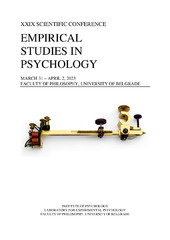Prikaz osnovnih podataka o dokumentu
Foreign language effect in imageability rating of the bullshit statements of different emotional valence
| dc.creator | Gorišek, Lea | |
| dc.creator | Damnjanović, Kaja | |
| dc.creator | Filipović Đurđević, Dušica | |
| dc.date.accessioned | 2023-11-02T16:50:00Z | |
| dc.date.available | 2023-11-02T16:50:00Z | |
| dc.date.issued | 2023 | |
| dc.identifier.uri | http://reff.f.bg.ac.rs/handle/123456789/5128 | |
| dc.description.abstract | The foreign language effect (FLE) refers to the observed difference in evaluations of the same material presented in the foreign language (FL) as opposed to the native language (NL). Previous research focused on the FLE in the context of meaningful material. The present study investigates the cognitive processing of nonsense, namely bullshit statements. We aimed to create bullshit and everyday statements in Serbian and English, which differ by emotional valence (EV) but are matched on various features, and to investigate whether it would be possible to match these statements for the imageability of their content. For that purpose, we conducted two studies on samples of Serbian native speakers (N1 = 91, N2 = 93). The first study aimed to select words for the final statements and collect lexical norms to control and manipulate the statement properties. We extracted a group of English words from the existing database, along with their familiarity, EV, and imageability ratings, and collected familiarity ratings from Serbian native speakers. The words were translated into Serbian and rated for EV and imageability. Based on these ratings, we created our database of the words and their translational equivalents familiar to Serbian speakers and matched them for EV. However, Serbian words were slightly more imaginable than their English equivalents (t(699) = 9.024, p < .01, d = .341). The second study aimed to evaluate the statements as a whole. Using our database of translational equivalents and the custom-made software, we created 480 statements. Bullshit and everyday statements were based on the same randomly selected sample of either negative, neutral, or positive words matched for other relevant lexical-semantic features. Participants rated the statements for EV and imageability. As intended, the statements differed by EV (F(2, 71) = 1053.09, p < .01, η2 = .904). Nevertheless, the everyday statements were evaluated as more imaginable than the bullshit statements (F(1, 71) = 235.201, p < .01, η2 = .385), and the statements in English were more imaginable that their Serbian equivalents (F(1, 71) = 59.111, p < .01, η2 = .055). The results show that the statements in the FL are rated as more imaginable than their NL translations, even though the constituting words were rated as less imaginable when presented in FL. The observed difference could result from the weaker foreign language entrenchment in the semantic network. | sr |
| dc.language.iso | en | sr |
| dc.publisher | Institute for Psychology and Laboratory for Experimental Psychology, Faculty of Philosophy in Belgrade | sr |
| dc.relation | info:eu-repo/grantAgreement/MESTD/inst-2020/200163/RS// | sr |
| dc.rights | openAccess | sr |
| dc.rights.uri | https://creativecommons.org/licenses/by/4.0/ | |
| dc.source | Book of Abstracts, XXIX Scientific Conference Empirical Studies in Psychology, March 31-April 2, Faculty of Philosophy, University of Belgrade | sr |
| dc.subject | foreign language effect | sr |
| dc.subject | imageability | sr |
| dc.subject | emotional valence | sr |
| dc.subject | bullshit statements | sr |
| dc.subject | psycholinguistic norms | sr |
| dc.title | Foreign language effect in imageability rating of the bullshit statements of different emotional valence | sr |
| dc.type | conferenceObject | sr |
| dc.rights.license | BY | sr |
| dc.citation.spage | 45 | |
| dc.identifier.fulltext | http://reff.f.bg.ac.rs/bitstream/id/12673/EIP2023_book_of_abstracts.pdf | |
| dc.identifier.rcub | https://hdl.handle.net/21.15107/rcub_reff_5128 | |
| dc.type.version | publishedVersion | sr |

